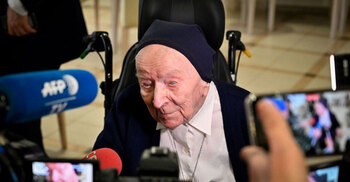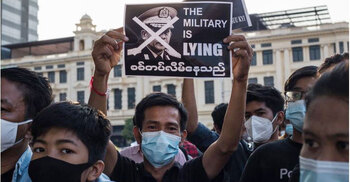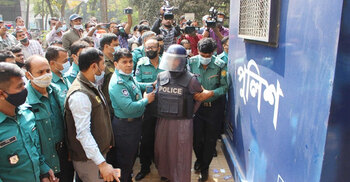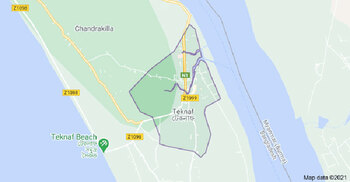I must really focus on gender equality, says Farah Ahmad
Bangladeshi origin Farah Ahmad has been appointed as the Chief of Staff in the Office of the Under Secretary for Rural Development of the United States Department of Agriculture (USDA).
Most recently, Ahmad served as the senior program coordinator in the Office of Consumer Education and a senior advisor to the chief operating officer at the Consumer Financial Protection Bureau (CFPB).
Prior to her time at CFPB, she served as the program manager on the Community and Economic Development team in the Rural Business Cooperative Service at USDA and senior policy analyst at Center for American Progress.
She holds a master's from Princeton University and a bachelor's degree from Cornell University. Basher Atiquzzaman, a Bangladeshi physician in Florida, took an interview of her recently.
Basher Atiquzzaman: This is BM Atiquzzaman from Orlando, Florida. Welcoming all of the viewers towards the world on behalf of Jago News. Today I have a very special guest. I have Farah Ahmad with me today from Washington DC. You know Farah a just appointed chief of staff of office undersecretary of rural development of US Department of Agriculture. And it's so nice of Farah joined us from Washington DC. Thank you Farah to join us.
Farah Ahmad: Thank you so much. It's a pleasure to be here. It's an opportunity to speak you and to share little better my story with the Bangladeshi community.
Basher Atiquzzaman: Thank you much. The whole Bangladesh community and people of Bangladesh are proud of you. Proud of your achievements. We know that in past you served as a programme director in the community and economic development team in the role business, cooperative service at USDA. You have experience working at a USDA in a leadership position. You also served as a senior programme coordinator in the office of consumer education, and senior adviser in the chief operating officer at consumer financial protection Bureau. Also you served as a senior policy analyst at Center for American Progress. My first question to you, your current leadership role, in Biden administration, what you will be doing?
Farah Ahmad: Yes, I am so thrilled and honoured to have been appointed by the Biden administration to this position. The US to promote agriculture or USDA. My role as chief of staff is to manage and oversee overall rural development nationwide. So, that's really about an expanding opportunities and world communities and I help improve economy in the world places. And the department, the area of the department, that I will be overseeing as chief of staff has a tremendous many resources. We provide loans, grants, other types of foreign assistances to our communities, to do everything from building community facilities like schools, health clinics, hospitals. We have to work on water system to people have clean water. We also connect people to broadband internet. In an age of computer, we need to be connected in a reliable way. My department will development, actually helps connectivity to our communities. And we also focus lot on electricity and energy access. It's really special place to support community in a variety of way like that. And I will say that in this specific role as a chief staff appointed by the administration, we really focus on doing now work, this is key priority in mind, in everything we do, starting day we want just you know we are very focused beating Covid-19 pandemic, whole world in really challenging way. We really focused on efforts for pandemic relief, restoring economy and the pandemic related other things. And we are also focused on climate crisis. Lastly, we are working to ensure equity and justice in the United States, across every project we do every community that we serve. And those are really the priorities not only of the Biden-Harris Administration but I have myself, I share the same goals, I care about those same goals very deeply and that’s why I am so excited and I am honoured to take on this role as chief of staff.
I am so excited and I am honoured to take this role as chief of staff.
Basher Atiquzzaman: Thank you much for explaining the broad responsibility on your shoulder and we all looking forward for your leadership. We know that you are very bright student from the beginning. Your parents are very brighter and you come from a bright family. You have bachelor from Cornell University and masters from Princeton University. But from the beginning of your career, you have shown your passion for public service, you settle a lot of sacrifice and dedication. We all curious what inspired you in the public service field. You have plenty of opportunities to do somewhere. You come to this tough field of public service.
Farah Ahmad: So I gather my inspiration from lot of different places, lot of different people, some of them I have only read on books, some of them I have known in my whole life, some of them I met in a few moments. I really think what keeps me going in a job like this is that I am inspired by hard working people that I get to support every day. I would say the royal community that we served those are the people who the people who help cook food on our plate and give us our natural resources, supply energy, I have had a lot of good fortune in my life, a lot of privilege in my life, and I have just always felt strong sense of you know If I can use all of those assets to help others and do small parts and play small role, that would be a success at the end of my life. And, I would say a lot of the works that I have done. Some of the challenges faced in other royal communities including those in Bangladesh, My visits to Bangladesh, especially the villages of my parents, my mother and father, I keep that in mind every day when I do the work that I do and that continues to inspire me as well. And that I would say my family as you mentioned has played a huge role even though, not everyone in my family is in public service, we have a lot of people who are teachers, who are scientists, who are doctors and engineers, and a variety of other fields. They have still shown me that it’s important and that’s help to make the world as better place. My parents for example they do so much community work and act as a leader of community in the mid-west, whether it’s doing a field work, global affairs work. They are still doing that every day after their long hours of teaching physics as college professors. So, I have seen the sacrifices they have made and the dedication that they have to helping their community, both in the mid-west and Bangladesh. And that inspired me to dedicate my whole life to it. There are other people of my family as well if I have little more time to talk about them as they really served as key inspiration to me.
Basher Atiquzzaman: I know you come from a very strong family background of educated and leader of Bangladesh. Especially you just told about your parents who are both professors of physics, your grandfather and grandmother especially your grandmother she was one of the pioneer of the movement for the women in Bangladesh, She was the lifelong vice-president of Bangladesh Mohila Parishad. She really fight hard for the equality, gender equality, and the poor women of Bangladesh. Would you please little bit about your family?
Farah Ahmad: Yes! My maternal grandmother, She, I would say, is my biggest inspiration. She passed away a few years ago. But, when I remember her life I would be so lucky to be able to do a fraction of the work she did in her life she touched. I remember as a young child just being so in owe of her. She was a teacher for 32 years in Viqarunnisa Noon School in Bangladesh. But like you mentioned she was a leader of many different organizations and she advocated for women empowerment, women’s right, at a time when it was very difficult even to start that conversation. I remember hearing about the work she did about women victims of war crime after the liberation war in 1971 making sure that they have economic security, emotional security, and social security. I was just so impressed by her boldness, her bravery, and her continued dedications to that all through her life. She’s probably best known for her time as vice president at Mohila Parishad as you mentioned. I must really focus on gender equality. It’s still something that we are fighting for today in lot of ways but she was the pioneer. She accomplished so much against all odds. Somedays when I am facing some big challenges, some difficult situations, I think of her. And I think of all she had done, all that she accomplished, motivate me to face these challenges had on to keep working, to keep working harder to find in other way. I miss her so deeply and I feel like a lot of work what I am doing is a continuation of her work and a continuation of her legacy. One think I remember that she always said is “she is really working for women so that they can be afforded dignity in society and I really see that is assimilation of my work, to make sure that every person is afforded a happy life with dignity. So, I really have heard of think for the frame of reference. I just wished that she were here to see me today but I know that she is somewhere. But I am still in a continuation of her.
Basher Atiquzzaman: I know your maternal grandmother very well when we grow up we saw her especially when used to go to near next to Bangladesh Mohila Parishad. She played a tremendous role to make their auditorium where they preliminary and primarily did all the dramas, cultural activities around that place because it’s such a vibrant and strong place. I know where the inspiration us coming from I am very sure that she is in heaven and she is smiling at you. We are very proud of you as well as your family. We all know that your family migrated from Bangladesh. You still have family who live in Bangladesh, in fact some of your family members, friends and family all of the world contacted me when I wrote about an article about you in the news portal in Bangladesh. They are all very proud of you. What do you want to tell them?
Farah Ahmad: well. I really want to say is, “Thank you.” My family has always been so supportive of me even a path less taken, it was a little unorthodox to take on a carrier in public service, and politics in the United States. But, I couldn’t have done it without their support of my family here in the United States and in Bangladesh and around the world. I really feel any accomplishment that I have is really their accomplishment too. It’s not my own singularly I would never be gone there where I am today. If I continue to make them proud, that would be huge success.
Basher Atiquzzaman: Being inspiration for the young especially the young Bangladeshi Americans, lot of them are interested to come to public service, mainstream politics, non-profit sectors and many other inspiring fields. At this point of our interview, I would like to invite Nabiha Atiquzzaman to ask you a question about your feeling.
Nabiha Atiquzzaman: I am a public health and pre-health student. I have a quick question for you. As a Bangladeshi American in the Biden-Harris Administration, what advice would you gift those in my generation?
Farah Ahmad: Well. Nabiha, so nice to meet you. Thank you so much for asking that question. It’s very kind of you to say that I have had a little bit of impact on some of the young people thinking about their carrier. I would just say that the world has so much challenges and we need new solutions that means we need new ideas from new young people, people of different backgrounds. Bangladeshi Americans have so much to offer I mean I would say President Biden understand this. He’s really focused on the fact that America, such a diverse nation and that makes it stronger. He is building the most diverse leadership team in the federal government right now. I wouldn’t be here if He wasn’t committed to that and building the team that looks like America and it’s reflective to our diversity. For young people, young girls, young women in the Bangladeshi community, I hope they do consider public service as carrier. Working in public service is truly a privilege and it’s an honor, it’s a carrier where you will wake up every morning, you will want to get out of that and go to work. It’s a carrier where you can use your mind in such a critical ways and also your hearts aligned with your values. It’s a carrier that’s really taught me to be bold, to be brave, and to be confident in myself. It allows me to use my passion and my creativity. And, it’s a carrier where you can really make a different in people’s life. It’s just so rewarding. I am sure a lot of other carriers are also rewarding but to know that I may make a small difference in the life of others. I couldn’t imagine a better carrier. My advice is go for it, explore it there are so many different parts of government, under state government, local government, there is federal government. There is also lot of great work of advocacy and there is something for everybody. I couldn’t imagine a better place for Bangladeshi American to share their experience, bring their perspective to the table and really have a huge contribution sharing this country in a wonderful direction.
Nabiha Atiquzzaman: Thank you so much.
Farah Ahmad: Thank you.
Basher Atiquzzaman: thank you very much. It’s really very inspiring very sure. This will inspire Nabiha and other young Bangladeshi American to go forward for public service what you are doing. A lot of proud Bangladeshi and Bangladeshi American will be watching this interview. I know you grow up here but you still know some Bengali. I have seen your pictures wearing sarees, your pictures into Bangladesh having Jhalmuri and Fusca in right next to Bangladesh Mohila Parishad. So, tell us something in Bengali.
Farah Ahmad: Well. Thank you so much for this interview and to everyone I would say “Sobaike Donnobad, Valo thakben”.
Basher Atiquzzaman: Onek Donnobad Farah Ahmad, apnio valo thakben. We all wish all the best for you and your family. It’s just the beginning of you in a new step of your life, Biden-Harris Administration. Again, we all are very proud of you. And we are looking forward to see you will be done a great work for our great nation, and the humanity and you will inspire everywhere, everybody, every Bangladeshi American all of the world. So once again thank you very much from the Bangladeshi community and also JagoNews Plateform.
Farah Ahmad: Thank you so much.







